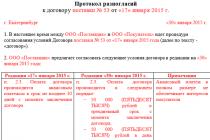According to housing legislation, payment must be made before the 10th day of the month following the month lived.
Dear readers! The article talks about typical ways to solve legal issues, but each case is individual. If you want to know how solve exactly your problem- contact a consultant:
APPLICATIONS AND CALLS ARE ACCEPTED 24/7 and 7 days a week.
It's fast and IS FREE!
If within the specified time public utilities have not been paid, utilities:
- notifies the debtor of the formation of debt;
- offers to voluntarily pay the specified amount.
The notification shall be sent either by mail or handed over against receipt.
This procedure protects the housing office, since if a person does not pay the debt, this notification can prove the fact that the company was trying to resolve the issue peacefully.
Sometimes serving a notice is enough for the tenant to repay the debt, because it is possible that the person was just having temporary difficulties.
So, if a person has financial difficulties for which it is not possible to pay the fee on time, the utility company may offer to issue.
If a person has a rent debt, you can conclude an agreement to pay the debt or, at the expense of which it is possible to pay a fee:
- monthly in certain parts;
- in a timeframe that is suitable for the service provider.
Duty to pay utility bills
One of the most acute problems in Russia today.
There is a deterioration in the economic situation and, as a result, an increase in prices for food, medicines, communication services, tariffs for electricity, gas, water, etc. However, the size wages, pensions and benefits remained at the same pre-crisis level, which led to a deficit in family budgets among the population. Naturally, something has to be sacrificed in this situation - hence the debt for utilities increases. It is about them, as well as about the methods of recovery and liability for non-payment, that we will discuss in detail later in the article.
The first consequence is the accrual of penalties
For non-payment of the required amount on time, a fine + debts for utilities is provided.

Sooner or later you will have to pay for them, only Management Company has the right to add 1/300 of the Central Bank refinancing rate for 1 day of delay. Every year this percentage is different, today it is 10.5% per annum.
An example of a penalty charge
Suppose a certain citizen named Petrov B.B. has a debt: housing and communal services - 10 thousand rubles, electricity - 15 thousand rubles. Company A, which is an electricity supplier, will charge a penalty:
15 thousand - the amount of debt multiplied by 0.105 percent. It turns out 1575 rubles, this result must be divided by 300, total: 5.25 rubles for each day of delay.
Of course, at first glance, the amount is small, but let's think about whether it is even worth bringing to such measures, if you still have to pay the entire amount.
Debt for utilities can be claimed through the court if the debtor voluntarily refuses to fulfill it. The decision is made in the form of a court order. A little about what it is.
Court order or what's the difference?
Legally illiterate people put an equal sign between and decision.

However, these are completely different regulations:
- The order is accepted by the judge on a sole basis, on the basis of written evidence that is not in doubt from the point of view of the law. The parties are not invited to the meetings, and the position of the defendant is not heard. This means that the debtor will not come to court and state that he actually paid, all checks are preserved, etc. Such a process initially assumes the result of the meeting: you will have to pay the debt (utilities) in full, the court will also add to penalize him state duty, as well as the collection of writ of execution bailiffs despite the fact that the citizen may not owe service providers anything at all.
- The decision is made on the basis of a litigation with petitions, opinions of the parties on the basis of equality of all before the law. During the process, the debtor may be present, express his opinions, present evidence, etc. If a citizen was credited with a debt by mistake, for example, in the event of a failure information system, then he can present all the saved checks as an excuse.
The court order, in case of disagreement with it, can be canceled within ten days from the date of its adoption. To do this, you do not need to give any arguments and arguments - just write in the objection: "I do not agree with the decision, please cancel it." This will be sufficient for the relevant proceedings.
However, the court order is canceled by those citizens who do not dispute their obligations, but do this in order to delay the collection of debts for housing and communal services, since their suppliers in this case will have to file with another court, and this will take some time.
Consequence two - limited supply
Government Russian Federation back in 2011, it allowed management companies to suspend supplies to debtors after 30 days after a warning.

Possible restrictions apply in case of incomplete payment in the amount of three minimum dimensions wages, which are calculated in accordance with the standards of its consumption, regardless of the metering devices located in the apartment. This means that it does not matter that a citizen went on a business trip without paying for water, for example, and then did not use water for several months. His water will still be turned off, as the company will think that it does not have any metering device, and, having reached the required standard mark, it will turn off the valve.

After the debt for utilities is paid off, the service provider company must resume the supply no later than two days.
Consequences three - eviction from housing
Apartment debts for utilities can lead to eviction from housing. Of course, here we mean citizens who hire him under a contract. social recruitment. The owner's debt (utilities) cannot lead to eviction, as in this case the property right enshrined in the Constitution will be violated.

But for those citizens who have entered into a social contract with the municipal authorities, such a measure is possible, but only by a court decision. Neither local authorities nor the management company have the right to independently make such decisions. The court during the meeting will deal with the reasons for non-payment. Perhaps they are respectful: the debtor's illness, layoffs, delays in paying wages, the citizen is disabled, etc.
The correct actions of the debtor to avoid problems
To try to avoid the above problems, we will analyze the rules of behavior.
The first thing to do when you receive notifications of a debt is to check all the calculations. It often happens that the companies are "wrong" and the tenants do not have the appropriate checks and receipts to prove their case.

Secondly, if there is still a debt, it is necessary to try to negotiate with service providers about a possible delay, providing installments in order to prevent supply restrictions. There are also people in the company, and they can understand the financial situation. At the very least, such actions will be useful in court proceedings - this may mitigate the court's decision, although it will not save you from payment obligations.
You need to know that sometimes installments are provided in without fail: if the cost of the service has become 25% higher, for example, than in the same month last year.
Disconnection (restriction) of supply can be carried out only when it does not harm other citizens in any way. For example, it is technically not possible to turn off the water in countryside for one house. It is necessary to carry out certain engineering works for this. But all costs will have to be paid to the debtor sooner or later if this happens.
"None of Your Business!", or Involvement of Collection Agencies
Some management companies enter into agreements to "knock out" debts with collection agencies. In judicial practice, there were cases of the latter going to court. When proving the existence of a debt, he sometimes ruled in favor of the plaintiff.
However, it should be noted that the Federal antimonopoly service of the East Siberian District indicated that the extrajudicial collection of debts from citizens for housing and communal services is unacceptable, it violates Art. 35 of the Constitution of the Russian Federation. In this decree we are talking about collection agencies, since the debts of citizens for utilities are not related to their activities. In other words, the Federal Antimonopoly Service said in legal language to such enterprises "it's none of your business."
The court passed - the debt remained, or Useless for utilities
Very often there are cases in judicial practice when the court ruled in favor of housing and communal services, and, as they say, there is nothing to take from the debtor. This happens in the following situations:
- The only housing.
- On the confiscated land is underway entrepreneurial activity: farm, greenhouse, etc.
- Cash receipts to the accounts are living wage for all family members.
- The debtor is a disabled person whose car cannot be confiscated.
In other words, there are debts, but it is not possible to collect them. Many employees of housing and communal services try to resolve problems with debtors in a pre-trial procedure by providing various installments, some, for example, able-bodied non-working debtors, are hired for one-time jobs that do not require special professional knowledge in payment a certain amount debt, etc.
Possible measures to reduce utility bills
Utility debts in most cases are not paid from the deficit family budget. To reduce them, mechanisms are needed to reduce the payment for services. As tools to reduce the burden of citizens on paying for communal services, many experts offer the following solutions:
- Limit collections from common house meters. It often happens that the amount of income in housing and communal services is less than the total meters show, then it is automatically distributed to the rest of the residents. Many politicians want to introduce legislative restrictions on such actions. In this case, management companies will be interested in finding out why funds are not received, which will lead to a fair imposition of individual tariffs.
- Provide consumers with influence on the approval of tariffs for housing and communal services by including them in various pricing commissions.
- Prohibit charging various percentages for paying for services to companies such as Sberbank and Russian Post.
I want to say that debts, of course, need to be paid. But management companies also make tariffs, as they say, from the ceiling, several times higher than real costs. The state, unfortunately, is not able to fix prices for housing and communal services today, which is very sad.
When persuasion and the search for a compromise do not help and the resident of the house continues not to pay, the managing organizations and the HOA go to court. This last resort work with debtors. To guarantee yourself success, you need to sort out in advance the issue of collecting fees for housing and communal services in a judicial proceeding.
Prepare documents according to the rules and in full
On April 18, Susana Kirakosyan, our regular contributor, Ph.D. in Law and Advisor to ALTHAUS Group on Civil and Housing Law, held an online seminar for us, where she told us how to correctly calculate the debt for housing and communal services.
At the online seminar, we discussed, among other things, how managing organizations competently prepare for litigation and leave no chance for the debtor to avoid paying.
In every house there is a conflict resident who has to managing organization personal dislike and does not pay out of principle. It is with such debtors that the MA works in court.
This is a complicated matter, therefore, on the part of the managing organization, everything Required documents must be completed correctly and submitted to the court in full. You need to start with a claim.
Correctly fill out the application for collection
In order to correctly fill out an application for recovery, you need to know where the owner has the obligation to pay for housing and communal services. And it appears for the following reasons:
- Art. 210, 249, 290 of the Civil Code of the Russian Federation - the owner bears the burden of maintaining the property belonging to him;
- Art. 153 - 158 of the Housing Code of the Russian Federation - the owner of the dwelling is obliged to pay a monthly fee for the dwelling and utilities by the 10th day of the month following the expired month;
- pp. "and" clause 34 of Regulation No. 354 - the consumer is obliged to pay utility bills in a timely manner and in full.
Links to these regulations Susana Kirakosyan recommends that you indicate in the application when collecting debts. So you will justify why the owner has the obligation to pay utility bills, and you have the right to demand this fee.
In order not to leave a chance for the conflict owner to find a flaw in the application, it is necessary to study judicial practice. Analysis of judicial practice will help to find out what position the courts take. For example, opinion Supreme Court RF will be decisive for the lower courts.
Using the position of the Constitutional and Supreme Courts of the Russian Federation will not only decorate the application for debt collection, but also give it serious weight and demonstrate your knowledge. Therefore, it is important for managing organizations and HOAs to familiarize themselves with the following documents:
- Decree of the Plenum of the Supreme Court of the Russian Federation dated June 27, 2017 No. 22;
- review of the judicial practice of the Supreme Court of the Russian Federation No. 2 (2015), approved. Presidium of the Supreme Court of the Russian Federation dated June 26, 2015;
An application for debt collection is submitted at the place of residence of the defendant (Article 28 of the Code of Civil Procedure of the Russian Federation, paragraph 7 of the Resolution of the Plenum of the Supreme Court of the Russian Federation of June 27, 2017 No. 22). Therefore, we recommend in the contract MKD management expressly provide that all disputes are considered at the place of conclusion of such an agreement.
Term limitation period for overdue time-based payments is calculated separately for each overdue payment and is equal to 3 years (clause 1, article 200 of the Civil Code of the Russian Federation, clause 24 of the Resolution of the Plenum of the Supreme Court of the Russian Federation of September 29, 2015 No. 43). The term begins to be calculated from the moment the person learned or should have known about the violation of his right.
If the debtor entity, then cases are considered in the order of simplified proceedings by arbitration courts. Simplified proceedings are possible with a claim amount of up to 500,000 rubles.
There is an imperative requirement for debtors-legal entities - the recoverer must attach the calculation of the amount collected as a separate document (clause 7, part 2, article 125 of the APC of the Russian Federation).
Arbitration courts, taking into account the status of the participants in the litigation, require to make complete and correct calculations, indicate in them the details of the invoices and data on the partial / full repayment of the debt by the defendant (number and date payment orders), confirm the accruals made with relevant evidence, submit acts of reconciliation of calculations that are relevant on the date of the court session.
More detailed information on judicial recovery You will find utility bills in the recording of the online seminar by Susana Kirakosyan. We have collected all the documents you need in handouts and attached to the article. Here's what you'll learn by watching the video:
- What documents will be required by the MA to collect debts for housing and communal services.
- Who and how has the right to certify annexes to the claim for the recovery of debt for housing and communal services.
- How to calculate the debt for housing and communal services, if there are several owners of the premises.
- What should be taken into account by the MA if the debtor is a legal entity.
- From whom is the debt collected when the premises are rented or leased.
- How to calculate the amount of the penalty (penalty) on the debt for housing and communal services.
- Is it possible to recover the debt for housing and communal services in case of invalidity of the control manual and the decision of the OSS.
- What circumstances exempt the owners of premises from payment for housing and communal services.
- Can the owner challenge the actions of the MA on the calculation of fees for housing and communal services and demand recalculation.
In the following articles, we will tell you how to certify attachments to an application, calculate penalties, and analyze common mistakes UO when calculating the penalty.
👉 Write to us or leave a request if you want to stop the growth accounts receivable in your managing organization, HOA or housing cooperative and return debts for housing and communal services. No one should live at someone else's expense!
Each apartment owner is obliged to make payments for the maintenance of housing. These include rent, expenses for electricity, gas, water, heat. However, if the amounts listed above are not deducted for a long time, then it becomes necessary to collect debts on utility bills by force.
In this regard, it is worth noting that in the summer of 2016, changes were made to the legislation, thanks to which housing and communal services debts can be collected in court under a simplified procedure.
Given that the fight against debt is a problem for public utilities, in this article we will talk about how and in what way to deal with debtors and get money for housing and communal services.
In this article:
How to collect utility bills
Many resource-supplying organizations, management companies and homeowners associations prefer and use the pre-trial procedure for collecting debts on utility bills.
In this case, time is saved, as well as money that can be spent on legal costs. As part of this procedure, notifications about the debt for housing and communal services are sent to the debtor, as well as reminder phone calls are made.
However, it is not always possible to obtain debt in this way. Then you need to go to court. There is currently new order collection of debts on utility bills, which can be carried out in the order of writ proceedings.
At the same time, it is worth paying attention to the fact that, unlike other categories of cases, a court order is issued to collect debts on utility bills regardless of the amount of obligations.
To obtain it, the creditor organization must apply to the court at the place of residence (registration) of the debtor.
The status of the court will depend on who the debtor is, if an individual, then you need to apply to the world court, and if a legal entity, then to arbitration.
To do this, it is enough to file an application for the issuance of a court order for the collection of debt for communal payments and the court will issue an appropriate writ. With this approach to resolving the issue, the size of the state duty will be half as much as in a regular lawsuit.
The procedure for considering a case on issuing an order for housing and communal services
The simplified collection of debts on utility bills is characterized by the fact that neither the applicant nor the opposite party, who has debts for utilities, are summoned to the court session.
Just arbitration court or the justice of the peace within 5 days accept the relevant document and send it to the participants in the process by mail.
The order includes not only the amount of the main debt, but also a penalty accrued for late payment of utility bills. Therefore, do not forget to indicate the amount of the penalty in the application for the issuance of the order.
Unlike statement of claim the debtor is unfamiliar with the content of the application for a court order. He is confronted with the fact of collecting the debt and its amount. Further, the person must decide on his own whether to pay utility bills, or try to challenge the court order.
However, it should be remembered that a special mechanism is provided for this. Unlike debt collection in a lawsuit, there is a different sequence of actions to cancel a court order. In particular, an appeal or cassation is not filed against an order.
What to do with a court order
10 days from the date of receipt of the text of the document are allotted for the debtor to be able to challenge it. The court may consider an application for the cancellation of a court order both in the presence of the parties and without them. Based on the results, a definition is adopted.
If the order is canceled, then the utility service should prepare a claim for the recovery of arrears in utility bills. It is subject to review general rules civil process.
If the order has entered into force, then it must be submitted to the bailiff service at the place of registration of the debtor. Next, enforcement proceedings will be initiated.
Important points when filing a claim for the recovery of housing and communal services debt
In order to solve the problem for itself, how to collect debts on utility bills, it is important for the organization to approach the preparation of the claim correctly.
In particular, it must indicate:
- Amount of debt broken down by periods.
- Details of payments received from the defendant.
- The amount of penalties accrued for violation of the terms of payment of utilities.
Based on the total amount of claims, the state duty is calculated.
The claim is accompanied by a reasonable calculation of the housing and communal services debt, as well as other evidence confirming the existence of the debt. These may include a claim and pre-trial correspondence with the recipient of utilities.
Be sure to take into account that the period for collecting debts on utility bills is 3 years, which is included within the general statute of limitations. It may well be that in terms of amounts it has already expired. Therefore, this circumstance should not be forgotten in the course of the upcoming trial.
As soon as the decision on the claim comes into force, then a writ of execution should be obtained for utility bills.
It is transferred to the bailiffs, who will collect the amounts awarded at the expense of the income or property of the debtor.
Organization of debt collection for housing and communal services
The current version of the Code of Civil Procedure of the Russian Federation allows you to collect utility debts, both on the basis of a court order and on the basis of a court decision on the collection of debts for housing and communal services. By the way, the same goes for unpaid phone or mobile phone bills.
A court order is issued without inviting the parties to court and may soon become a reason for the work of bailiffs. As for the claim proceedings, it can take up to two months. Plus, certain time may go to execution.
Therefore, in some cases it is important to competently build work with the debtor. You can invite him to the utility service in order to verify the current debt, and determine the procedure for its repayment. It is quite possible that as a result of negotiations it will be possible to achieve an installment payment.
It is also important to keep an inventory of utility debts. So you can protect yourself from the risk of missing the statute of limitations.
To do this, the organization must have an appropriate unit and specially developed instructions, such as.
Everyone is required to pay utility bills - both the owners of the premises and their tenants.
Dear readers! The article talks about typical ways to solve legal issues, but each case is individual. If you want to know how solve exactly your problem- contact a consultant:
APPLICATIONS AND CALLS ARE ACCEPTED 24/7 and 7 days a week.
It's fast and IS FREE!
Recently, even tenants have begun to pay for resources using individual metering devices.
Obligations to pay utility bills
The obligation to pay utility bills is assigned to all users of residential and non-residential premises.
The obligation to pay for housing and communal services arises from the moment of registration of the right to use or own the premises.
As long as the owner or tenant is not the owner or owner, the communal is paid either by the state or by the previous owner.
For example, citizens move into an apartment under a social contract of employment. Before that, no one used this apartment, and it stood empty.
The tenant and members of his family will have to pay utility bills from the moment the social lease agreement is signed and registered with Rosreestr.
Until now, the owner, that is, the municipality, pays for the communal apartment.
Another example. The family buys an apartment in a new building. As soon as the ownership right is registered with Rosreestr, the obligation to pay utility bills will be assigned to the owner and members of his family.
Until this happens, the developer pays for the communal apartment. The same applies to apartments from one individual, another.
The Housing Code is the main law that regulates the procedure for setting tariffs for utilities, the procedure and terms for their payment, and also establishes liability for non-payment of mandatory payments.
All services must be paid according to the established tariffs.
The amount for some services depends on the area of the premises, and some services are paid by meters.
Eviction from residential premises for non-payment of utility bills occurs in accordance with the current edition and .
What do they include?
The public services provided include:
The tenants of the premises pay additionally for the possibility of using the premises, and the owners pay for the overhaul.
If the consumer continues to ignore the payment of the communal apartment, then the supply of the service will be completely stopped after the accumulation of a six-month debt.
In addition, the service company may apply to the debtor. The subject of the claim will be the collection of debt, as well as penalties and fines, if any.
As a rule, one written notice is enough for the debtor to pay the entire amount.
But if there are funds to repay the entire amount, you can apply in writing to the service company and conclude on repaying the debt in installments.
This will mean that the debtor:
Do not forget about the main amount of utility bills, which must be paid in statutory terms.
If the family has financial difficulties, and there is not enough money to pay for housing and communal services, you can apply.














It can be counted on by those families in which utility bills account for 22% or more of all family income.
For the calculation, not only working family members are taken into account, but also other payments.
Then one payment will come to all conscientious payers, and another one to the “problem” payer.
Then it will be seen who specifically does not pay the bills. So it is possible from the apartment of an ex-husband who does not pay his bills.
If the debt is six months or more, then the service company can sue this debtor.
The supplier, due to objective reasons, cannot limit the consumption of a particular service.
This procedure applies both to homeowners and members of their families living in this apartment, and to tenants and members of their families.
Citizens who live in an apartment temporarily pay only for individual consumption of resources according to meter readings.
They do not pay amounts that depend on the number of registered citizens.
It is possible to conclude a written or oral agreement with permanently registered tenants on payment of those services, which are calculated in proportion to the area of the dwelling.
From tenants
When the owner enters into a tenancy agreement with tenants, it must reflect the procedure for paying utility bills.
Now there is such a practice - tenants pay for the services that are provided by meters. That is, "how much they poured and burned, so much they pay."
If the lease agreement is concluded in accordance with all the rules, and is registered with the Rosreestr authorities, then it is necessary to collect debts in court.
Only the plaintiff will be not the service company, but the owner of the premises.
If the contract is concluded in a simple written form, then you can also sue, while presenting witnesses that the defendant lived in this apartment.
But, in practice, the owner terminates the contract with tenants and evicts them from his apartment.
He will have to pay the utility bills himself. This is the minus of the lease agreement!
From owners
The procedure for collecting debts on utility bills from owners is exactly the same as from registered persons - in court.
Action algorithm
To collect debts on utility bills, the service company must follow the following procedure:
| Notify debtors in writing about the occurrence of debt | you need to do this when the non-payment period is 3 months. The notice may be sent by mail or delivered in person. The recipient must sign. The notice must contain the following information:
|
| The debtor pays the debt on time | and brings the payment to the service company, and it withdraws claims from the debtor |
| If the "debtor" is sure that a certain error has crept in | and he has no debts, then he takes receipts for payment, and goes to a service company. There he needs to visit the accounting department or the customer service department to find out the resulting amount of debt. If it still exists, you need to pay for it immediately. |
| If the debtor does not respond to the notification | and the debt continues to grow, the service company limits the provision of a particular resource. With a debt of six months or more - file a lawsuit in court |
For what period?
Utilities must be paid by the 10th next month, which follows the calculated one.
That is, it was necessary to pay the bill for August before September 10. From the 11th, debt is already beginning to form.
But, as a rule, the supplier does not pay attention to such "trifles". And if the deadline for non-payment approaches 3 months, then it is necessary to carry out pre-trial work with the debtor by notifying him.
A claim for the forcible collection of debts for utilities can be sent to court only after 6 months from the date of the last payment.
Important! If the debtor paid at least part of the debt (for example, 100 rubles out of 20,000 rubles of debt) during this six months, then the service company does not have the right to file a claim against him.
Penalties
As soon as a debt for utility bills is formed, the service company begins a “fight” with debtors.
First of all, a written notice indicating the deadline for payment of the debt.
If this does not help, and the debt continues to “hang”, then the public utilities have the right to apply the following sanctions to the debtor:
- Calculation of interest on the amount of the debt.
- Restriction on the supply of public services.
- Complete cessation of supply.
- Eviction from the premises.
The first 2 sanctions can be applied when residents do not pay utility bills for 3 months.
The last 2 sanctions are an extreme measure, and they are applied if the debt is six months. You can only be evicted from a dwelling based on a court decision.
Eviction
The most extreme measure of punishment that can be applied to a debtor is eviction. It is possible only by a court order.
Public utilities can sue the debtor only if he has not paid his bills for six months or more.
That is, the last payment for the apartment must be received on the account of the service provider more than six months ago.
Moreover, if the debtor paid at least some amount during these 6 months, public utilities cannot sue him.
Only tenants of residential premises can be evicted from the apartment. This measure cannot be applied to the owners, since the eviction actually violates the right to property, one of the basic values of the rule of law.
As already mentioned, eviction is possible only by court order. In making such a decision, the court takes into account the reasons for which the debt arose.
The concept of a “good” reason for non-payment is not spelled out in the law, but, as arbitrage practice, these can be considered:







Reasonable causes of debt include:
- alcoholism and drug addiction;
- "forgetfulness" of the employer and his family members.
Eviction from municipal apartment for non-payment of utilities occurs with the provision of other housing, but according to the norms for the provision of space as for a hostel - at least 6 square meters. m per registered family member.
It is worth remembering that it is quite difficult to collect a debt from a minor tenant of the premises!
Penalty charge
As soon as the debt begins to form, the service company has the right to charge interest on it.
You can do this from the 11th day of the next month after the settlement month, if payment has not been received by the 10th day.
For 1 day of delay, the utility company has the right to charge penalties in the amount of 1/300 of the refinancing rate on the date the debt arose.
Depending on the amount of debt, it turns out about 25 - 40 kopecks per day.
Information that interest has been charged on the amount of the debt is displayed on a separate line on your utility bill.
First of all, it is necessary to pay the interest, and only then the principal amount of the debt.
Paying utility bills is an obligation, and debt is an obligation. And like any outstanding obligation, it can be recovered through the courts.
A court order is applied to "light" debtors - this simplified order civil litigation.
The defendant is not summoned to court, he receives a copy of the court order for the recovery of utility bills by force.
Having received a court order, the debtor has the right to challenge it within 10 days or pay off the debt.
If neither one nor the other has happened, the service company may apply to the bailiff service for debt collection in the manner of enforcement proceedings.
Disabling services
The handling company must present to the court all documents proving that the defendant is not paying the bills.
Required documents
The list of documents that must be attached to the claim is indicated in.
Sample claim
The statement of claim is submitted exclusively in writing, there is no oral form of filing.
It must be compiled in accordance with the requirements.
Namely, it should contain the following information:
| In the upper right corner is the "header" of the document | here the following information is indicated in a disclosed and reliable form:
|
| Then comes the main part of the lawsuit - its "body" | Here, the plaintiff provides the following information:
|
| Final part | here is the plaintiff:
|














